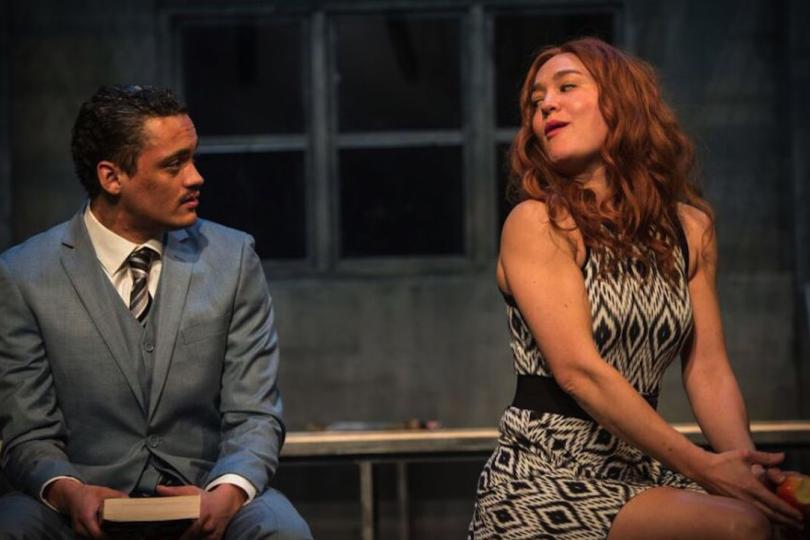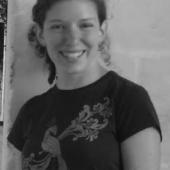50 years on

Director Talvin Wilks kicked off Penumbra Theatre’s evening of theater by mentioning Penumbra’s role as a “community forum.” It was a passing reference, but it stuck with me. In so many ways, all theater is supposed to be a community forum, a place where people can come together to share ideas and get glimpses into one another’s lives.
Penumbra walks the talk in a number of ways, from its educational programming and race workshops to smaller details like emailing out both the program and a study guide the day before the show, so you can come into the theater with some of the context you need.
A community forum also requires rich substance to feed its audience’s conversations. And, whether or not the avant-garde vibe of Dutchman and The Owl Answers resonates with you personally, both plays provide ample fodder for discussion afterward.
Let’s start with what they have in common: both plays were written in the mid-1960s in the context of the Black Arts Movement, and both straddle lines between realism and symbolism. Both are set in a subway car – which, by the way, is artfully lit by Marcus Dilliard and designed by Maruti Evans, whose creative talents reign supreme in The Owl Answers. Both deal with psychic traumas caused by centuries of racism. But the plays spring from utterly different artistic and political sensibilities, so you and your theater-going companions may find yourselves more drawn to one or the other. Don’t worry: that will just give you more to talk about.
Sexuality and race
Amiri Baraka’s Dutchman is better-known than The Owl Answers, and also more accessible in that it has a clear narrative structure. Clay, an educated black man portrayed masterfully by Nathan Barlow, encounters a white woman on the train who instantly sets out to seduce him. She goes by the name of Lula, and in this production, Kate Guentzel plays her character as forceful, assertive, and definitely intoxicated, although whether with drugs, alcohol, or her own sexuality, it isn’t clear. Guentzel can’t sit still – her hips are always writhing slightly, or her hand is maneuvering itself up and down Barlow’s leg, or she has her head tipped back in hysterical laughter. She plays Lula as an off-kilter force of nature, and while her intensity could be to her credit (Rohan Preston loved her performance), I personally wished she would turn down the volume a bit, so we could engage more with the complicated racial dynamics that her character sets in motion.
As Lula baits Clay with a combination of gender- and race-based attacks, the stakes aren’t simply about being black in America, but specifically about the cultural baggage around black masculinity. That might be why I found myself following Barlow’s reactions more closely than Guentzel’s incessant gyrations – I could see Barlow physically registering each one of her attacks and assumptions differently depending on their implications, which made his performance and ultimate impassioned reaction riveting to watch. Lula confronts Clay with two deeply ingrained and contradictory forces - the fear of emasculation and stereotypes of black male aggression - and Clay's attempts to resist both threats suggest that black men may ultimately have few safe outlets. While intersectional black feminism is something that has gained cultural traction these days, director Lou Bellamy’s interpretation of Dutchman makes a strong case that we could be talking about black men in terms of intersectionality as well.
The second play of the night
The Owl Answers, by Adrienne Kennedy, takes on intersectionality in a different way altogether. While ostensibly about black women, white men, and the scars of historical traumas such as rape and fatherlessness, Kennedy tackles her subject matter on a visceral level rather than an intellectual one. Director Talvin Wilks has coordinated a spectacular design team to make this happen. From Kevin Springer’s eerie, echo-chamber sound effects, to Mathew LeFebvre’s larger-than-life costumes, to Maruti Evan’s surprisingly transformable set, nothing in the production is allowed to be predictable or comfortable.
Austene Van carries the performance as Clara Passmore, the child of the recently-deceased Richest White Man in The Town and a black woman who cooked for him. Raised by Reverend Passmore and his wife, Clara is denied access to both her biological father and the white side of her heritage. She dreams of going to England to bury her father and connect with her cultural ancestry, which includes William the Conqueror, Shakespeare, Chaucer, and Anne Boleyn.
Psychic experience over plot
But from the moment the play begins, the plot takes a clear backseat to her psychic experience. This is the sort of symbolic surrealism that won’t be everyone’s cup of tea, but to his credit, Wilks doesn’t attempt to tame the script in any way. He gives free reign to all of the anguish of having to deny half of one’s past, of being surrounded by conflicting messages about Madonnas and whores, and of an interracial woman’s attempts to forge her own identity amidst the clamor of oppressive forces around her. If you’re open to it, The Owl Answers has a powerful message, despite it being hard to express in words.
In Penumbra’s lobby, there is a large chalkboard with the question, “In this time of racial strife, how do we chart a new way forward?” When I saw the play, no one had yet written a suggestion. It may be an impossible question, and it’s also true that neither Dutchman nor The Owl Answers provides any easy answers. But in their complexity, both plays speak to each other and to contemporary audiences concerned with issues of racial equality.
In a strong, unapologetically challenging evening of theater, Penumbra asks its audiences to engage deeply with the past, present, and future of black male and female identities. It is exactly the kind of community forum that many theaters should strive to be. I hope some of you start writing on that chalkboard.




